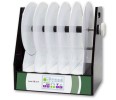Authors
F. Marchand, R. d'mello, P. Yip, M. Calvo, E. Muller et al
Lab
King's College London, Wolfson Centre for Age-related Diseases, Neurorestoration Group, London, United Kingdom.
Journal
Molecular Pain
Abstract
BACKGROUND: Central sensitization requires the activation of various intracellular signalling pathways within spinal dorsal horn neurons, leading to a lowering of activation threshold and enhanced responsiveness of these cells. Such plasticity contributes to the manifestation of chronic pain states and displays a number of features of long-term potentiation (LTP), a ubiquitous neuronal mechanism of increased synaptic strength. Here we describe the role of a novel pathway involving atypical PKC_/PKM_ in persistent spinal nociceptive processing, previously implicated in the maintenance of late-phase LTP. RESULTS: Using both behavioral tests and in vivo electrophysiology in rats, we show that inhibition of this pathway, via spinal delivery of a myristoylated protein kinase C-_ pseudo-substrate inhibitor, reduces both pain-related behaviors and the activity of deep dorsal horn wide dynamic range neurons (WDRs) following formalin administration. In addition, Complete Freund's Adjuvant (CFA)-induced mechanical and thermal hypersensitivity was also reduced by inhibition of PKC_/PKM_ activity. Importantly, this inhibition did not affect acute pain or locomotor behavior in normal rats and interestingly, did not inhibited mechanical allodynia and hyperalgesia in neuropathic rats. Pain-related behaviors in both inflammatory models coincided with increased phosphorylation of PKC_/PKM_ in dorsal horn neurons, specifically PKM_ phosphorylation in formalin rats. Finally, inhibition of PKC_/PKM_ activity decreased the expression of Fos in response to formalin and CFA in both superficial and deep laminae of the dorsal horn. CONCLUSIONS: These results suggest that PKC_, especially PKM_ isoform, is a significant factor involved in spinal persistent nociceptive processing, specifically, the manifestation of chronic pain states following peripheral inflammation.
BIOSEB Instruments Used:
Aron Test or Four Plates Test (LE830),Rotarod (BX-ROD)

 Douleur - Allodynie/Hyperalgésie Thermique
Douleur - Allodynie/Hyperalgésie Thermique Douleur - Spontanée - Déficit de Posture
Douleur - Spontanée - Déficit de Posture Douleur - Allodynie/Hyperalgésie Mécanique
Douleur - Allodynie/Hyperalgésie Mécanique Apprentissage/Mémoire - Attention - Addiction
Apprentissage/Mémoire - Attention - Addiction Physiologie & Recherche Respiratoire
Physiologie & Recherche Respiratoire
 Douleur
Douleur Système Nerveux Central (SNC)
Système Nerveux Central (SNC)  Neurodégénérescence
Neurodégénérescence Système sensoriel
Système sensoriel Système moteur
Système moteur Troubles de l'humeur
Troubles de l'humeur Autres pathologies
Autres pathologies Système musculaire
Système musculaire Articulations
Articulations Métabolisme
Métabolisme Thématiques transversales
Thématiques transversales SFN2024: Venez rencontrer notre équipe sur le stand 876 à Chicago
SFN2024: Venez rencontrer notre équipe sur le stand 876 à Chicago 